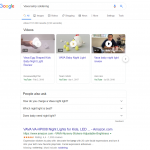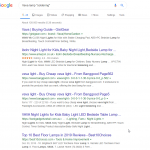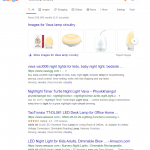I will try to write this article in two languages and publish it separately, because there is something that does not seem to have attracted much attention, so I think it’s important talk about it. You are free to share this article. Here you’ll find the German version
TL;DR: If you don’t want to read it all, there’s a bullet point list at the end.
The issue – Google removes words from my search
Not again! You may have noticed the following situation more often on Google recently. I’ll take one of many examples to illustrate what I’m talking about.
For example, I bought a lamp from Vava. Unfortunately, this one has hit the ground more than once and I need a little advice from the devices insides. Maybe someone has already … No, no luck with “soldering”
Wait, but what is this? Google has already omitted the word “soldering” on the first search result? Please also pay attention to the number of search results: 151,000
Ok, so if I click “Must include: soldering”, Google does what most, even today unfortunately, don’t know they can do. It enforces my word in the search with the help of quotation marks, double quotation marks. It must be included, otherwise the result is not valid. This is nothing new, Google could do this already for … well, from my point of view, always. There are also many of these Google Fu tricks. ‘InSite’, ‘InURL’ and ‘filetype’ searches are really just the beginning. Incidentally, these functions are also available in other search engines and have therefore become virtually universal.
But here, too, the result is worthless. There are now only 128,000 results! Well, that makes it much easier (/sarcasm). Not only that, no, in the first and third results, the word “soldering” does not even occur – otherwise it would be shown as thick as result two. The “…” in between symbolizing missing text.
The worst? With quotation marks I exclude the word “solder” or similar spellings. Excellent! For 23,000 fewer results so my search restricted in the wrong direction.
Alright, lets try again! How about … “Vava lamp circuitry”? Side note: Google does not suggest typing for “circuit” or “circuit board” when typing for me. And again – the first and third result don’t even contain all words.
At least: The second hit contains “circuit”, a related word. Quasi context-based. You would think I’m working with the biggest search engine in the world!
Again I click “must include”, again I exclude valid contexts and this time even bring the results from a quarter of a million down to 10,900. Sounds almost like I’m getting closer to my result (which may well be 0). But of course Google does not want to accept that – again – and now desperately spits out the word “vava” – partly. By the way, if you now think V A V A in this sequence and with dots or hyphens in between is not valid, you’d be wrong.
That was one example. I depend on finding fast and reliable search results in my line of work. Anyone who thinks that the work of a consultant can not do without such searches today – be it Google, Bing or Fireball (yes, why not) – will be disappointed. Information changes too fast. Pages where information is located (docs.microsoft.com) or posted (blogs.technet.microsoft.com) change several times a week. This is true for Microsoft, Citrix, VMWare – you name it. The greats have at least begun to document their things and to centralize – that may not be true for a small provider.
Speculation
Google doesn’t have an easy life. They need to constantly rethink how they generate new money while keeping their customers and the ad agencies happy. More, more, more but more please serve everyone. In the past Google was the best because they understood that the context in which someone searches is the most important thing in a search. If I threw a sentence at them, Google cared for every word adding imaginary + in between (and now, that doesn’t change the example described). Often a few words have been enough. Today, Google treats me like a freshman at Kindergarden. “Did you mean” is (as shown above) really only the tip of the iceberg. When I search something that has 100,000(ish) entries, words are taken away from me.
Google forgot what made it. In my opinion what happens here almost borders on manipulation, if not censorship. Very similar to YouTube making subscriptions a two step process (PLEASE PRESS THE BELL) to show you what they think is best. This makes Google more and more unattractive as a search engine. Instead of improving yourself, you’ve taken one … maybe two steps back here. The wet dream of a search engine dev has to be to see connections between each search term. Develop context, observe how context changes over time, and how one’s own algorithm adapts. But apparently, Google just fresh ran out these types of developers. Maybe you should look at your 2 million applications a year not just at the 10x devs.
How could Google improve?
- Reduce the number of search results required for the “remove words” “””feature””” to be activated
- In the beginning this “Anti-Feature” was only active below a certain number of search results. Words would be removed if the number of results dropped below a couple of thousand. Why this number was raised? I don’t know, but 10,000 results are quite a lot considering that only a lower percentage of people even use the second or third page.
- When words are removed, it has to be made much more visible
- Most users I talked to about this didn’t even notice that words had been removed from their results. I’m sure some of you found this article because you where angry at Google as well.
- If words are added again, then not with quotation marks
- Because that completely misses the point of a context based search. Remember? The thing that made you who you are today. If would exclude a lot of good potential results. Konjugations are important in German and English. Denn das schließt viele potenzielle Ergebnisse aus. Konjugationen im englischen wie im deutschen sind wichtig. Variations or Hybrids as well – the quotation marks are killing these.
Thanks for reading!





